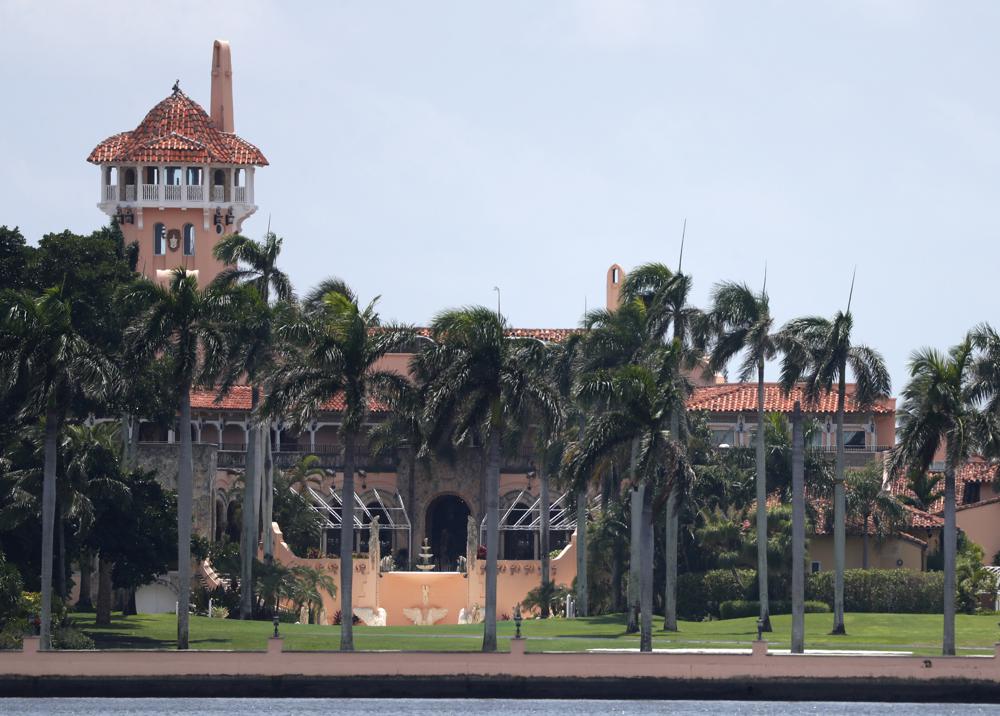The FBI searched former US President Donald Trump’s Mar-a-Lago estate as part of an investigation into whether he took classified records from the White House to his Florida residence, people familiar with the matter said Monday. Trump disclosed the action in a lengthy statement, asserting that agents had broken into his safe in a search he decried as evidence of “dark times for our nation.”
The search, which the FBI and Justice Department did not immediately confirm, marks a dramatic escalation in law enforcement scrutiny of Trump and comes amid a separate but intensifying probe into efforts to overturn the results of the 2020 presidential election.
Trump and his allies immediately sought to cast the search as part of a Democratic-driven effort to keep him from winning another term in 2024, even though the Biden White House said it had no prior knowledge of it and the current FBI director, Christopher Wray, was appointed by Trump five years ago and served as a high-ranking official in a Republican-led Justice Department.
“After working and cooperating with the relevant Government agencies, this unannounced raid on my home was not necessary or appropriate,” Trump said in his statement.
He added: “These are dark times for our Nation, as my beautiful home, Mar-A-Lago in Palm Beach, Florida, is currently under siege, raided, and occupied by a large group of FBI agents. Nothing like this has ever happened to a President of the United States before.”
Justice Department spokesperson Dena Iverson declined to comment on the search, including about whether Attorney General Merrick Garland had personally authorized the search.
Trump did not elaborate on the basis for the search, but the Justice Department has been investigating the potential mishandling of classified information after the National Archives and Records Administration said it had retrieved from Mar-a-Lago 15 boxes of records containing classified information earlier this year.
The National Archives referred the matter to the Justice Department. Trump has previously maintained that presidential records were turned over “in an ordinary and routine process.”
There are multiple federal laws governing the handling of classified records and sensitive government documents, including statutes that make it a crime to remove such material and retain it at an unauthorized location.
Two people familiar with the matter, who spoke on condition of anonymity to discuss an ongoing investigation, said the search happened earlier Monday and confirmed that agents were also looking to see if Trump had additional presidential records or any classified documents at the estate.
Though a search warrant does not suggest that criminal charges are near or even expected, federal officials looking to obtain one must first demonstrate to a judge that they have probable cause that a crime occurred.
In his first public remarks since news of the search surfaced, Trump made no mention of it Monday evening during a tele-town hall on behalf of Leora Levy, the Connecticut Republican he has endorsed in Tuesday’s U.S. Senate primary to pick a general election opponent against Democratic U.S. Sen. Richard Blumenthal. Trump gave his public backing to Levy late last week, calling her on Monday the best pick “to replace Connecticut’s joke of a senator.”
But in a social media post Monday night, he was much more unguarded, calling the search a “weaponization of the Justice System, and attack by Radical Left Democrats who desperately don’t want me to run for President in 2024.”
During the 2016 presidential election, Trump sought to exploit an FBI investigation into his Democratic opponent, Hillary Clinton, over whether she mishandled classified information through a private email server she used as Secretary of State. Then-FBI Director James Comey concluded that Clinton had sent and received classified information but the FBI did not recommend criminal charges because it determined that Clinton had not intended to break the law.
Trump lambasted that decision and then stepped up its criticism of the FBI as agents began investigating whether his campaign had colluded with Russia to tip the 2016 election. He fired Comey during that probe, and though he appointed Wray months later, he routinely criticized him too while he was still president.
The probe is hardly the only legal headache confronting Trump. A separate investigation related to efforts by Trump and his allies to undo the results of the 2020 presidential election — which led to the Jan. 6, 2021, riot at the U.S. Capitol — has also been intensifying in Washington.
And a district attorney in Fulton County, Georgia, is investigating whether Trump and his close associates sought to interfere in that state’s election, which was won by Democrat Joe Biden.

